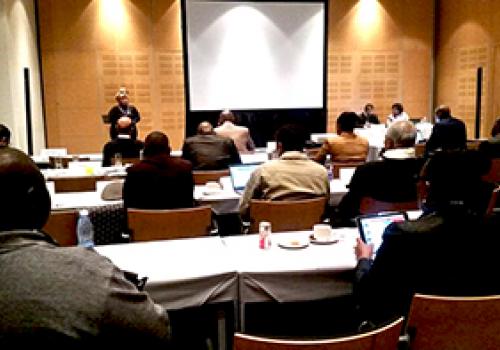SADC Secretariat in partnership with WorldFish and the Government of South Africa hosted the 5th meeting of the SADC Working Group on Aquaculture on the 26th June 2017 in Cape Town, South Africa. The meeting was held as a Pre-Conference workshop of the World Aquaculture 2017 Conference which is taking place from 27-30 June 2017 in Cape Town, South Africa. The Conference theme is “Sustainable Aquaculture- New Frontiers for Economic Growth”.
The meeting was attended by 11 SADC Member States, viz. Angola, Botswana, Malawi, Mauritius, Namibia, Seychelles, South Africa, Swaziland, Tanzania, Zambia and Zimbabwe. Other countries which participated in the meeting include Kenya, Nigeria and Uganda. Development partners in attendance included the African Union Inter-African Bureau for Animal Resources (AU-IBAR), Centre for Coordination of Agricultural Research and Development in Southern Africa (CCARDESA), the Food and Agriculture Organization of the United Nations (FAO), Intergovernmental Agency for Development (IGAD), Indian Ocean Commission (IOC) SmartFish Programme, NEPAD Planning and Coordination Agency (NPCA), Bill and Melinda Gates Foundation, and WorldFish.
The meeting discussed programmes that are being developed to support implementation of these two strategies that were approved recently by the Ministers, Aquaculture and Aquatic Animal Health Strategies. Key programmes which were discussed and adopted include:
- An “Environmental Management Framework for Sustainable Aquaculture Development in Southern Africa” that provides the basis for sectoral policy and management, which is a collaboration with the African Union Inter-African Bureau for Animal Resources (AU-IBAR). The framework will enable Member States to i) apply the principles of ecosystems approach to aquaculture (EAA) at the sectoral level; and ii) identify key components to develop and implement appropriate mechanisms for specific regional and national environmental management of aquatic animal production systems
- Secondly, drawing lessons from key success factors on growth of the aquaculture sector in a number of SADC countries, including Malawi, South Africa, Tanzania, Zambia and Zimbabwe, a “Science-Based Aquaculture Development Model” together with a mechanism for a regional “Aquaculture Scientific Mentorship Scheme” for young scientists were proposed, which will involve collaboration with WorldFish, and also between universities and research institutions, governments, private sector and communities in the region.
Member States and development partners also had a chance to review the outcomes of a study undertaken by WorldFish and the Government of South Africa in the SADC region. The study was undertaken with a view of developing an “Aquaculture Evaluation Tool for the SADC Region.” The aims to provide a systematic mechanism for evaluating the development of aquaculture industries and projects in the SADC region. The tool will inform governments, funders and investors as to the sets of drivers that are likely to determine project success or failure and evaluate projects against these in a process that identifies where weaknesses lie and where interventions need to be made to ensure robust project viability. The tool will be further refined and tabled for validation at the SADC Technical Committee on Fisheries for validation.
Finally, the Member States discussed the proposal from WorldFish on collaboration in the development of a harmonized fish genetic improvement programme in the SADC region, under the CGIAR Research Program on Fish. A Task Team consisting of Botswana, Tanzania, Zambia and Zimbabwe was set up to develop a position paper for this programme, that could be further discussed by the SADC Technical Committee on Fisheries, and is expected to guide approaches to aquatic animal genetic improvement in the region, taking into consideration the environmental and biosecurity issues.

